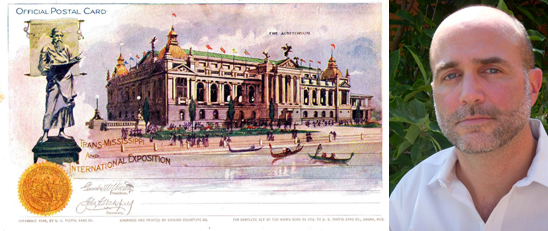
The 1898 Trans-Mississippi Exposition brought thousands of people to Omaha to experience a world fair built on the success of the Chicago Columbian Exposition of 1893. Such fairs produced a wealth of materials used today by scholars to study many aspects of the fair such as the construction, inventions, agriculture, performances, attractions, newspaper articles, photographs, and the participation of Native Americans, African Americans and Hawaiians in displays of American culture.
Timothy Schaffert, UNL assistant professor of English, is developing an online resource to gather those exposition materials into a comprehensive archive for scholars and researchers, but also accessible for non-scholars. Schaffert received a digital fellowship from the Plains Humanities Alliance, a program administered by the University of Nebraska's Center for Great Plains Studies, which he is using to develop the content and archival materials for the project in collaboration with the UNL Center for Digital Research in the Humanities.
Schaffert is working with Omaha Public Library, which already has a Trans-Mississippi Exposition online resource including a set of photographs by F.A. Rinehart, the official photographer for the exposition. But Schaffert intends to add to that resource by identifying more resources open to the public and finding new collections and items not yet archived. His online resource will be housed on a website sponsored by the UNL Center for Digital Research in the Humanities.
Schaffert said the resource will open with a short narrative on the fair then feature links to resources such as the Wakefield Scapbook by Mrs. John Wakefield, who served as the exposition's first historian, a calendar of the exposition, a gallery of images, maps and blueprints of the fair, buildings and exhibits, the Indian Congress, a historiography and publications from the fair.
Schaffert began his work by creating a Facebook page called "Trans-Mississippi & International Exposition (Omaha World's Fair)" at http://www.facebook.com/TransMissExpo. He shares historical notes from the Omaha Public Library site such as "Today at the Omaha World’s Fair (July 26, 1898): The fish in the lagoon are starving. Bits of bread tossed in bring hundreds to fight over it ... Picnic parties would perform a charitable act if they would throw left over bits into the lagoon to feed the fish ..." (http://www.omaha.lib.ne.us/transmiss/bee/july26.html).
Besides finding scholarly resources, Schaffert is looking for materials from individual collections. He can be reached at tschaffert2@unl.edu or 402-472-0908.
— Linda Ratcliffe, Center for Great Plains Studies